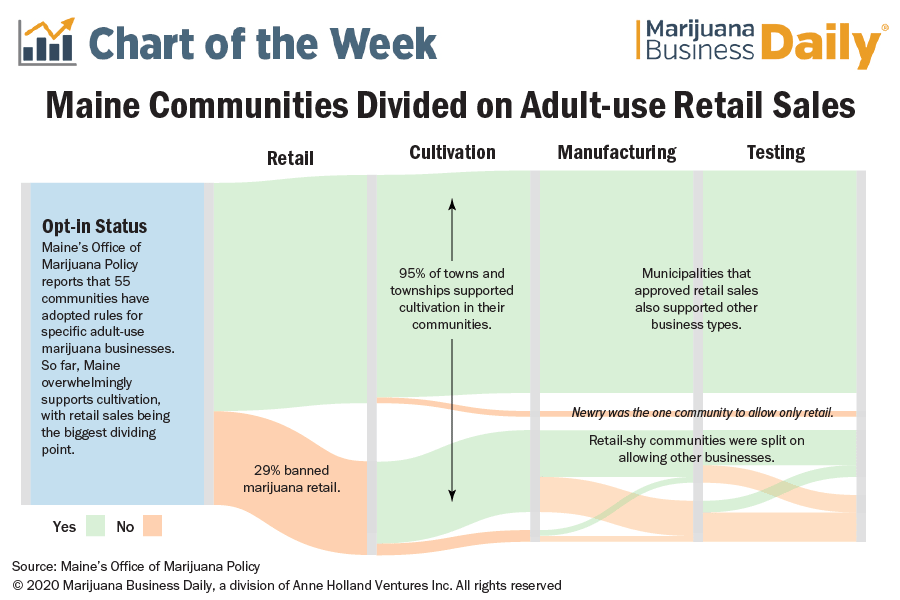 (Editor’s note: This story is part of a recurring series of commentaries from professionals connected to the cannabis industry. Jeffrey Harris is co-founder and CEO of Springbig, a Florida-based cannabis marketing, communication and CRM software company.)
(Editor’s note: This story is part of a recurring series of commentaries from professionals connected to the cannabis industry. Jeffrey Harris is co-founder and CEO of Springbig, a Florida-based cannabis marketing, communication and CRM software company.)
Unlike mainstream retailers, cannabis retail businesses can access only a limited number of platforms to communicate with customers.
Social media and traditional marketing and advertising outlets are often unavailable to cannabis businesses, making it even more important that retailers use available marketing tools as effectively as possible.
For the vast majority of cannabis retailers, text-message marketing is a literal lifeline to consumer audiences.
Text messages have a 98% open rate and 90% are opened within three minutes of being sent, making text-message marketing the most efficient way to engage with customers.
Cannabis retailers – held to some of the strictest regulations for text-message use – are leading by example, taking steps to curtail the alarming rise in spam messages.
Fortunately, the same regulations that make messaging more complex for cannabis businesses also structure this communication channel in a way that facilitates compliant and engaging messages.
Serious about compliance
Because marijuana is a Schedule 1 substance, the Cellular Telecommunications and Internet Association (CTIA) and state-level cannabis marketing regulations prohibit text messages containing overt language about MJ sales and transactions, usage methods, non-U.S. Food and Drug Administration-approved health benefits or language that glorifies the use of cannabis.
In addition to the CTIA, cannabis SMS marketing is governed by the Federal Communications Commission and the Telephone Consumer Protection Act (TCPA).
These regulations require businesses to obtain double-explicit consent from consumers, opting them in to receive texts about loyalty programs or product promotions.
Unfortunately, a growing number of illicit cannabis retailers are buying phone number lists and blasting customers who never opted in.
This alarming trend not only reflects poorly on the industry but can also have serious financial and legal repercussions.
The FCC might levy fines ranging from $500 to $1,500 per unlawful message, not including any damages or legal fees that arise from litigation.
Legal businesses are extremely cautious about following these regulations.
Retailers are ensuring their customer-communication methods are lawful by investing in compliance platforms that help them choose language, messaging and consent collection processes that will not run afoul of regulations.
Multiple ways to gain consent
Double consent means consumers must certify twice that they agree to opt in to receiving loyalty program or promotional texts, which traditionally happened through conventional “text-to-join” or “reply YES” messages.
However, these messages have low response rates, meaning the number of customers who reply to consent will be less than the number who open the message.
Making the double-consent process as convenient and streamlined as possible can increase the number of opt-ins.
Cannabis retailers achieve this by providing multiple platforms to opt in, such as allowing customers to join at checkout or on the store’s website, through an NFC chip (i.e., “tap here to join”), a scannable QR code or a text-to-join code.
To increase opt-in response rates, many platforms are beginning to ask for digital signatures as the second form of consent – a more advanced method recently adopted by the industry that can be signed by the customer on a tablet at checkout or on their own mobile device.
That means the entire loyalty enrollment process could take place inside the dispensary, increasing the odds of obtaining the second form of consent, or outside the store, which might appeal to customers in the COVID-19 era.
Additionally, retailers must make clear to staff and customers that joining a loyalty program or consenting to receive messages is never a requirement to complete a purchase. In fact, either not giving customers a choice or automatically opting them into dispensary notifications is also against regulations.
And customers who have opted in must always be able to opt out. This can be done by adding “Reply STOP to opt out” at the end of all messages.
Segmentation as best practice
Cannabis retailers are increasingly adopting point-of-service (POS) technology to segment customers based on interests and purchasing habits.
Established retailers have evolved beyond sending message blasts to every customer in their directory and are instead targeting specific customers through segmentation.
Segmentation allows retailers to create more cost-effective marketing campaigns using hyper-targeted messaging and promotions directed at customers who will be most receptive to them.
Targeted marketing also demonstrates that the retailer values customers’ time and preferences, ultimately facilitating long-term loyalty.
For example, a customer who has not purchased pre-rolls from their cannabis retailer might become frustrated or annoyed about receiving pre-roll promotions and decide to unsubscribe from the store’s texts all together.
By targeting messages specific to categories and formats the customer has purchased, retailers can make messaging feel more personal and less like spam.
Text-message marketing is one of the most effective methods to reach cannabis consumers, but retailers must follow strict regulations around messaging and consent.
The legal industry must continue to proactively work together to mitigate rising levels of spam marketing while still engaging with customers in a productive manner.
Jeffrey Harris is co-founder and CEO of Springbig, a Florida-based cannabis marketing, communication and CRM software company. He can be reached at jeffrey@springbig.com.
The previous installment of this series is available here.
To be considered for publication as a guest columnist, please submit your request here by filling out our form.







